|
SHOCKING NEWS
W
hat started as a routine one-week checkup
suddenly seemed to progress toward a parent's nightmare. Emi was
feeding nicely and gaining weight, but our pediatrician, Dr. Bob
Quigley noticed something unusual. “I feel something in the left
belly, don't know what it is, could be stool or perhaps the
kidney,” he remarked. “I don't feel anything on the right side,
however. Let's get an ultrasound, just to be safe.”
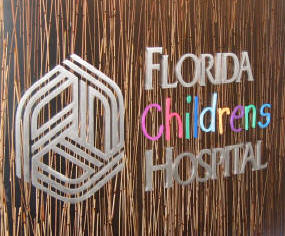
Seven days later, at Emi's ultrasound
appointment, we were quizzing her ultrasonographer “What's
that?” I asked, pointing to a round circular shape just adjacent
to the left kidney. “I don't know,” was her short reply. The
presence of an unusual solid mass where the left adrenal gland
should have been was confirmed by the pediatric radiologist, Dr.
Greg Logsdon, after getting an abdominal CT scan. This usually
means only one of two diagnoses: a collection of blood (adrenal
hemorrhage), or a cancerous tumor called neuroblastoma. After
discussion with Dr. Quigley, it was decided she should be
admitted to Florida Children's Hospital as soon as possible.
HOSPITALIZATION AND SURGERY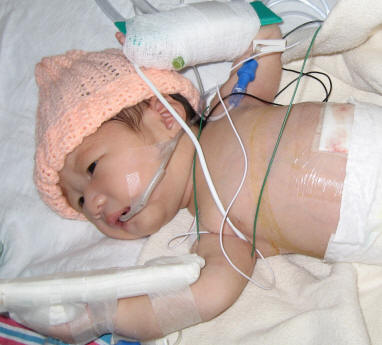
Although the pediatric hospital was full, we were able to
get her admitted that same evening into a room with a view, no
less. The pediatrician on call, Dr. Siddiqui, the pediatric
oncologist, Dr. Cliff Selsky, and the pediatric surgeon, Dr.
Mark Chaet, all evaluated her within hours of admission. Emi
would need to receive a battery of tests to evaluate whether the
tumor had spread to other parts of the body. Surgery was
scheduled three days later, for Friday.
The one inch tumor was successfully removed in its entirety,
although it was not an easy procedure. (Click
here for a photo of the tumor--may be graphic to some).
The neuroblastoma had partially wrapped itself around the aorta,
making removal of the cancer difficult. That evening after
surgery was the toughest for Emi. She cried in pain, requiring
narcotic medications, with a tube inserted into her mouth down
to her stomach to suction out any secretions. IV fluids were
given to keep her from dehydrating, as she would not be able to
drink anything for three days. Despite those obstacles, Emi
remained tough, bouncing back almost as if nothing had happened.
On Sunday the tube was removed, Monday started drinking small
amounts of Pedialyte, by Tuesday was taking breast milk without
complications, and was discharged Thursday, after a 10-day
hospital stay. All tests came back negative for malignant
spread.
|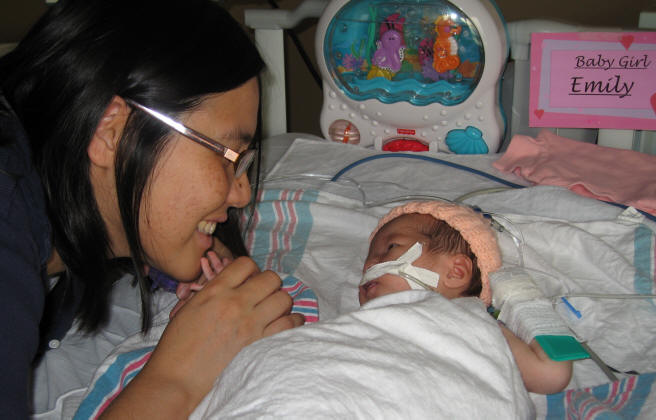
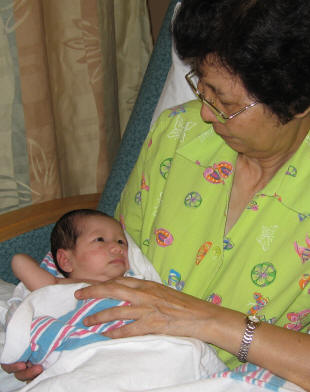 LESSONS
FOR MOMMY AND DADDY LESSONS
FOR MOMMY AND DADDY
The prognosis for neuroblastoma in a newborn is excellent (see
“What is Neuroblastoma,” left column). She will not require any
chemotherapy, and the only reminder to Emi about this ordeal as
she gets older will be a small abdominal scar. Although she will
be fine, this experience taught Emi's parents several important
lessons.
We learned to appreciate Emi more than
ever. When Emi was born, we were concerned about the typical
stuff: how to breastfeed, when to open that 529 account, how to
handle sleepless nights. Then all of a sudden hearing that your
child has cancer brings instant fear—the
fear that we might actually lose our precious daughter.
Priorities instantly change. In the end we are, oh, so relieved
to know that we will see her grow up, but realizing the fact
that life is truly a fragile gift makes us appreciate our
daughter even more.
We learned how important a good,
thorough pediatrician is. Had it not been for the
experienced hands of Dr. Quigley, he would have not felt that
mass. His other physician colleagues had high praise that this
was caught early. And of course, getting that ultrasound was the
best advice we took. My advice to all of you: listen to your
pediatrician!
We learned what it is like to sit on the
other side of the patient-provider fence. Although we are
both healthcare professionals, those roles became irrelevant. We
were Emi's parents, and we lost all objectivity related to her
care. What we knew needed to be done became torture to us;
minutes seemed like hours at times. The two most difficult
situations for parents to endure was seeing Emi in obvious pain
and not being able to feed her when it was clear she was hungry.
For Emi, attempts to start an IV were often unsuccessful; at one
point she endured 10 pokes just to get an IV started. The
whole view changed once our role of patient and provider were switched.
We learned that we had supporters who
were praying for us. Our friends started numerous prayer
groups for Emi's behalf. It was amazing how much support we had,
even from those we didn't know too well. We want to thank all of
you for your comfort, your support, and your prayers.
Finally, we learned (again) that God is in
control.
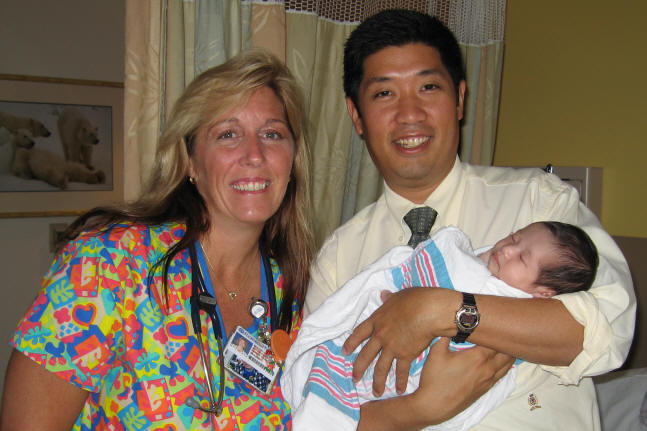
Yes, it was a close call for Emi. We are so thankful for
the opportunity to see her grow up. However, it is not just Emi
who will mature and grow. Emi has taught us, too. Both Mommy and
Daddy have learned important lessons in life, and in the end, we
have come out
stronger as a result of this experience.
 |